Prospects For A DACA Deal Still Not Looking Good
Congress seems no closer to a DACA deal than they were in January.
In addition to a budget deadline that expires at midnight on Thursday, Congress is also heading back to work today with the status of the Deferred Action For Childhood Arrivals program unresolved, and the prospect of a deal looking as difficult as it was last month, as the CNN report I cited in my post about the budget notes:
John Thune, a member of Senate Republican leadership, told reporters last week that he favors narrowing the immigration debate from President Donald Trump’s suggested “four pillars” to two: legal status for DACA recipients and border security.
The framework suggested by the White House would provide 1.8 million undocumented immigrants a pathway to citizenship in exchange for $25 billion for border security, in addition to the eradication of the diversity lottery and changes to so-called chain migration.
Democrats are wary of making the kinds of changes to family immigration — also known as chain migration — and the diversity lottery that Republicans are demanding, effectively stalling the talks and leading to Thune’s suggestion to limit the reforms to DACA and border security.
But House Freedom Caucus Chairman Mark Meadows called Thune’s suggestion a “nonstarter,” saying that it would not get support in the House.
Aides say if an open-ended floor debate happens it will likely take place the following week, but it’s not clear exactly how or for how long the debate would take place.
In the meantime, heavy negotiations are expected to continue this week among party leaders and the White House. A separate effort by a large bipartisan group of senators is also underway.
Durbin signaled some of the headwinds facing the President’s plan, saying the proposed changes to the US immigration system were not acceptable.
“Understand what they are proposing,” Durbin told CNN. “They want to cut legal immigration into the United States of family members, some of whom who have waited 20 years or month to join up with their families here. This is no longer about the security of the United States. It is not about competition for American jobs. It is an effort by them to make a different immigration policy in the future, one that envisions an America that is much different than it is today.”
Toward that end, Senators John McCain and Chris Coons are introducing a bipartisan proposal of their own that stops short of the broad immigration proposals that have been put forward by others:
Two senators eager to see Congress start crossing items off its long to-do list on Monday introduced a bipartisan plan designed to settle two of the more pressing parts of the immigration debate and let lawmakers move on to other issues.
Sens. John McCain (R-Ariz.) and Christopher A. Coons (D-Del.) formally introduced a bill that would grant permanent legal status to undocumented immigrants known as “dreamers” and start bolstering security along the U.S.-Mexico border. But the measure would not immediately authorize spending the $25 billion President Trump is seeking to fortify the border with new wall and fence construction. Some Republicans are seeking at least $30 billion.
The McCain-Coons plan also would grant legal status to dreamers who have been in the country since 2013 — a larger pool of undocumented immigrants than the 1.8 million Trump supports legalizing.
The bill says nothing about curbing family-based legal migration or making changes to the diversity lottery program — two other priorities for Trump and conservative Republicans.
Coons told reporters Monday that he’s not yet heard from top congressional leaders about his proposal and sees it as one of several potential proposals that could earn a vote.
He said that “a broader solution” introduced by Sens. Richard J. Durbin (D-Ill.) and Lindsey O. Graham (R-S.C.) is one possible compromise for senators to support, but that he is “also conscious of the fact that there’s very little time left” until the March 5 deadline to end the DACA program for dreamers and that Trump’s “unconstructive engagement” with Durbin and Graham on the issue means that their bill “may not be feasible.”
Trump, Durbin and Graham clashed in an Oval Office meeting last month when he dismissed some of their potential proposals and labeled some African nations and Haiti as “shithole countries” — comments that roiled Washington for several days Ana contributed to the partial shutdown.
Coons said his proposal with McCain could be “a fresh start” and “strong starting place” for the Senate’s upcoming debate.
In a statement, McCain said the bill ”would address the most urgent priorities” of legalizing the status of dreamers and make changes to border security — and allow Congress to move on.
“It’s time we end the gridlock so we can quickly move on to completing a long-term budget agreement that provides our men and women in uniform the support they deserve,” he added.
(…)
Whether the McCain-Coons bill could pass the Senate is unclear — but it is nearly identical to legislation already introduced in the House with wide support. The USA Act, introduced by Reps. Will Hurd (R-Tex.) and Pete Aguilar (D-Calif.), has 54 co-sponsors — 27 members from each party — and has been the subject of conversations between Trump administration officials and senior congressional leaders trying to sort out the contours of a potential immigration debate.
But conservative lawmakers and some administration officials already consider the plan insufficient because it fails to do more to boost security along the southern border.
Like the House version, the new Senate bill calls for the use of drones and other technology to establish better “situational awareness and operational control of the border.” Rather than immediately spending the billions of dollars Trump is seeking for new wall and fencing construction, the legislation would require the secretary of homeland security to submit to Congress a new southern border security strategy within a year of the bill’s passage. That plan would need to include “a list of known physical barriers, levees, technologies, tools, and other devices that can be used to achieve and maintain situational awareness and operational control along the southern border” and a projected cost per mile for any changes.
“While reaching a deal cannot come soon enough for America’s service members, the current political reality demands bipartisan cooperation to address the impending expiration of the DACA program and secure the southern border,” McCain said.
Coons added that the bill ”doesn’t solve every immigration issue, but it does address the two most pressing problems we face: protecting DACA recipients and securing the border.”
Even before the McCain-Coons proposal was formally introduced, though, President Trump appeared to shoot the idea down in an early morning tweet:
Any deal on DACA that does not include STRONG border security and the desperately needed WALL is a total waste of time. March 5th is rapidly approaching and the Dems seem not to care about DACA. Make a deal!
— Donald J. Trump (@realDonaldTrump) February 5, 2018
As I noted immediately after the government shutdown ended last month, even if the Senate moves forward in good faith to come up with a bill that can be put on the floor for a vote, the prospects that any such bill will ultimately pass are not exactly good. The main reason for this is because there remain significant differences between what is likely to pass the Senate, what is likely to pass the House, and what the President find acceptable. In many ways, the differences between what can get over those three hurdles are so extreme that, as I noted last week, the prospects for a deal were difficult at best and grim at worst.
We still don’t know what form that bill would take in the Senate. The McCain-Coons proposal seems to have merit and as if it could be something that a bipartisan majority in that body could get behind, it’s not the only proposal on the table at the moment. In addition to this new proposal, there’s also a proposal that has been on the table since last month that was devised by Senators Lindsey Graham and Dick Durbin. That deal came after President Trump appeared to originally say that he would sign into law virtually anything that Congress could pass related to protecting DACA beneficiaries. Based on that seeming commitment, Graham and Durbin came up with a deal that extended DACA protections, provided funding for border security although not necessarily for Trump’s border wall, ended the visa lottery, and introduced some limitations on so-called “chain migration” that allows people in the country legally to sponsor even some distant family members for legal entry to the United States. When that deal was presented to the President, though, he immediately dismissed it in an Oval Office tirade that included his infamous reference to so-called “shithole countries” as a source for immigrants. Finally, shortly before the shutdown last month, Senate Minority Leader Chuck Schumer met with Trump and believed he had reached a deal with the President that would have extended DACA in exchange for partial funding for the President’s beloved border wall. When Trump pulled the rug out from under Schumer, Democrats blocked passage of a budget bill in the Senate and forced the shutdown. After the shutdown was resolved, Schumer declared his offer to the President to be off the table, but there appears to be some indication that it could be revived if there was a chance it could pass both the Senate and the House.
Even if the Senate can come up with a deal that gets a bipartisan majority, it’s unclear that it or anything like it would have any prospect of passing in the House of Representatives. At the very least, it’s clear that any deal that could get a majority of votes from the Republican majority would need to address both the DACA issue and border security, including funding for the President’s border wall. Additionally, many House Republicans have said that they wouldn’t support a deal that didn’t also deal with broader immigration issues such as the visa lottery and the so-called “chain migration” issue. Finally, based on the reaction to the plan that the White House released nearly two weeks ago, it appears that any deal that includes any prospect that DACA beneficiaries could eventually apply for citizenship could be dead on arrival in the House. This would mean that both the President’s proposal and the one that Senators McCain and Coons are sponsoring would have a tough time making it through the House.
Finally, of course, there’s the question of what the President would find acceptable. Sometimes, it seems as though Trump would be willing to sign off on any deal that could pass both the House and the Senate, but that’s far from certain in reality. As Chuck Schumer noted during the shutdown, negotiating with this President is like negotiating with Jello. On pretty much any issue, he’ll say on one day that he’ll support a piece of legislation that meets certain criteria then he’ll turn around and quash that deal later on based either on what he sees on Fox News Channel or what advisers like Stephen Miller, a known immigration hardliner, manage to whisper in his ear. As I noted above, the White House has put forward a proposal of its own, but in many respects, that plan is similar to the plan that Senators Graham and Durbin presented to him before the shutdown, and he shot that plan down immediately when it was presented to him. Now, he appears to have had a similar reaction to the McCain-Coons proposal even before it is formally put on the Senate floor. Given that, pinning him down to what he’ll agree on is difficult at best and that is no doubt making negotiating in both the Senate and the House difficult. After all, if you know what the President will sign off on, what’s the point of putting in the work to come up with something that can pass both chambers?
Hovering over all of this, of course, is the approaching deadline of March 5th, at which point the six month waiting period that was set when the Administration first announced the end of DACA will end and all of the DACA beneficiaries will become potential targets for deportation. To some extent, the impact of this deadline will be muted by the Order entered by a Federal District Court Judge in California that placed a nationwide injunction on the Administration’s order. That injunction, however, hasn’t prevented from DACA beneficiaries from losing their status based on the terms of President Obama’s original order due to the fact that Immigration and Customs Enforcement is not accepting extension requests at this time. By some estimates, the number of beneficiaries dropping off the role could be as high as 150 people per day. Given this, the time within the month remaining before the deadline expires is limited at best.
Ideally, it seems as though a deal on this issue should be an easy enough one to reach if the parties involved are willing to compromise. The proposal from the White House, the proposal from Senators Graham and Durbin, the deal offered by Senator Schumer before the shutdown, and the proposal that Senators McCain and Coons have come up with have many differences, but they also have many similarities. Unfortunately, for many Republicans there seem to be several dealbreakers present in all three of the agreements. Jazz Shaw. captures one of the primary ones in his post about the McCain- Coons proposal at Hot Air, and other objections have been noted by immigration hardliners in the House. From my point of view though, the proposal by Senators McCain and Coons seems like a reasonable solution, at least for the immediate issue of the imminent expiration of the DACA program. Yes, it’s true that it doesn’t provide an answer to more comprehensive issues like the visa lottery and “chain migration,” it does deal with the immediate issue of what to do about the approaching DACA deadline. Additionally, while I don’t support the President’s ridiculous idea of a border wall that Mexico pays for, enhancing border security by using a combination of technology such as camera surveillance and, yes, improved physical barriers in at least some locations. seems like a reasonable ideal. I also support the idea of giving DACA beneficiaries what would essentially amount to Permanent Resident Alien status with the prospect of applying for citizenship at a future In fact, I see no reason why any DACA deal should not include a path to citizenship after some period (one suggestion puts the period at 10-12 years which is longer than the period that other people with Green Cards have to wait.) Whether that kind of deal can pass Congress is another question, of course. However, a DACA deal that puts the DACA beneficiaries into what amounts to second-class status by making them ineligible to *ever* apply for citizenship to the only country they’ve ever known. That’s unfair, bad policy and wholly unnecessary retribution against people who are here illegally for reasons that are not their fault at all.
Unfortunately, what’s reasonable and what can actually get done in Washington are often mutually exclusive.
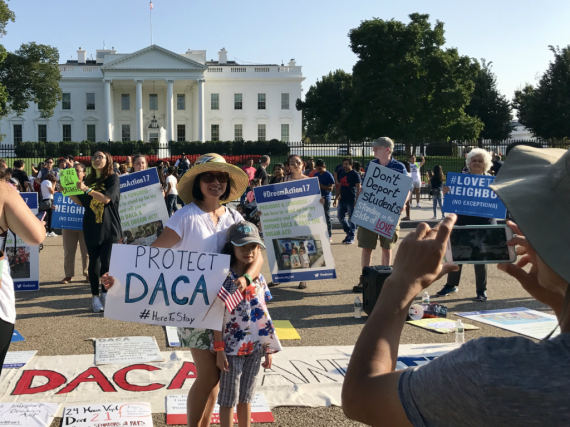

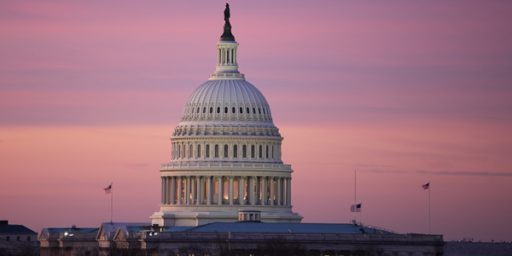
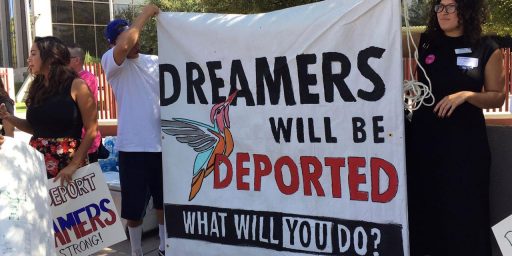
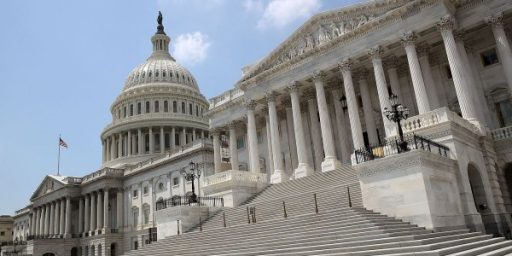
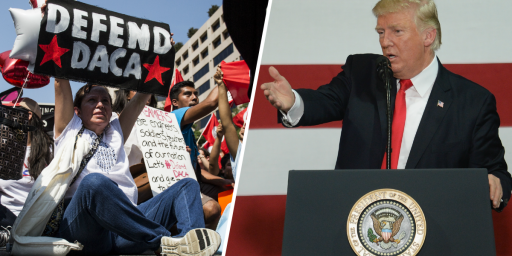
If the present Republican Party in D.C. allows an immigration bill to pass, they will have the impossible job of justifying it to their primary voters. If Pres Trump signs such a bill he will lose one of his strongest issues. Politically it is a far superior position for the R’s to keep stirring that pot. I have some admiration for Sen Durbin and his mates persisting in their efforts but there is no reason to expect any part of the immigration issue to go away or go quiet.
As far as those millions of our friends and neighbors of foreign origin and questionable documentation go, sucks to be them when the R’s run the town.
Seems like it would take a courageous deal maker to help forge and allow a compromise immigration bill to pass. I have not seen anyone like that in the past 12 months.
It seems to me that Ryan and McConnell are afraid of Trump and his core support, and if Trump won’t sign off on a bipartisan proposal, neither will they.
Republicans have becomes so strict on this topic to please their rabid base they’re even talking about limiting legal immigration. They’ve started going after people with green cards – here legally, gone through the process, did everything right – and the reaction from the right has been a shrug and “after awhile, you really should be applying for citizenship.” For all the screaming about illegals, what we’re seeing is the government going after legal and illegal alike, drawing little distinction other then “non-citizen”
Trumpkins don’t just want a wall – they want a bubble to be erected around the nation and keep it exactly the way it is, no new comers allowed. There’s no deal a Republican can accept that won’t get labeled “amnesty” and them “sell-out” by the Breitbart crowd…. and thus, all conservatidom.